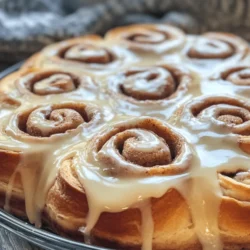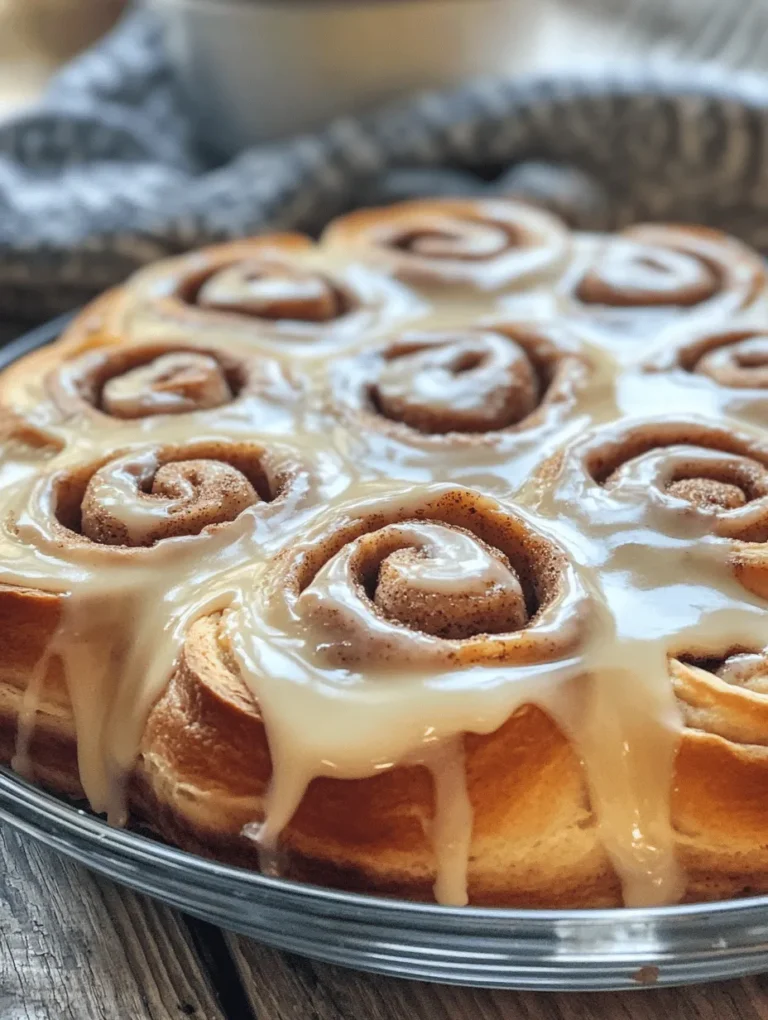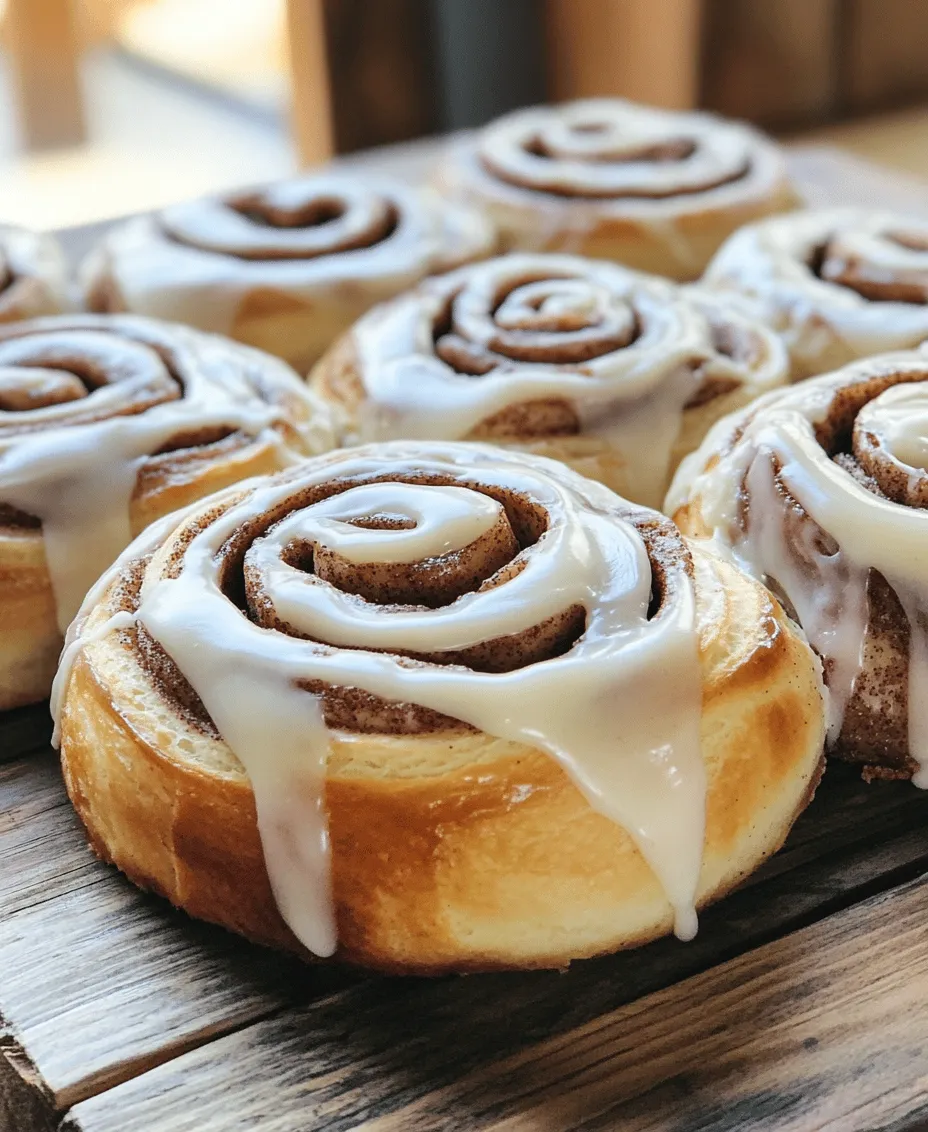Introduction
There’s something inherently comforting about the aroma of freshly baked cinnamon rolls wafting through your home. The process of creating these delightful confections is not just about the end product, but also about the joy and warmth that fills the kitchen as memories are stirred into the dough. Homemade cinnamon rolls represent a perfect blend of sweet and savory, with layers of soft dough enveloped in a luscious cinnamon-sugar filling. Each bite is a testament to the care and love that goes into their creation.
Cinnamon rolls have an irresistible appeal that transcends generations, making them a beloved treat during cozy mornings, festive celebrations, or simply as a comforting snack. The combination of warm spices, sweet creaminess, and the signature gooey texture captures the hearts of many, often evoking nostalgic memories of family gatherings and cherished traditions. This recipe for “Cinnamon Swirls of Joy” promises to deliver that same sense of comfort, inviting you to indulge in the delightful experience of baking, sharing, and savoring these sweet rolls.
The Allure of Cinnamon Rolls
Cinnamon rolls have a rich history that spans across various cultures and continents. Their origins can be traced back to ancient times, where cinnamon was a prized spice, believed to possess medicinal properties. The use of cinnamon in baked goods can be found in many regions, from the sweet rolls of Northern Europe to the sticky buns of the United States. As these delectable treats made their way through different cultures, they evolved into the beloved breakfast and dessert items we know today.
In Scandinavian countries, cinnamon rolls, or “kanelbullar,” are a staple of coffee breaks, celebrated for their soft, buttery texture and fragrant spice. Meanwhile, in the United States, they have become synonymous with weekend brunches and holiday festivities. The rise of cinnamon rolls as a cherished indulgence has seen numerous variations, from the classic style topped with cream cheese icing to innovative twists featuring caramelized nuts, fruit fillings, or even chocolate swirls.
The universal appeal of cinnamon rolls lies in their ability to evoke feelings of warmth and togetherness. Whether enjoyed at a family gathering or as a special treat for oneself, these rolls are sure to bring a smile to anyone’s face. The perfect combination of flavors—sweet and spicy, soft and chewy—creates a sensory experience that is hard to resist. It’s no wonder that cinnamon rolls have secured their place in kitchens around the world, becoming a symbol of comfort and joy.
Ingredients Breakdown
Creating the perfect cinnamon roll begins with selecting high-quality ingredients. Each component plays a crucial role in achieving the desired flavor and texture, ensuring that your rolls turn out just right. Here’s a breakdown of the essential ingredients for “Cinnamon Swirls of Joy”:
All-Purpose Flour
All-purpose flour serves as the foundation for the dough, providing the necessary structure and elasticity. The gluten developed during mixing and kneading enables the dough to rise beautifully, resulting in soft, fluffy rolls. For the best results, it’s important to measure the flour accurately—using the spoon-and-level method is ideal to avoid overpacking the flour.
Whole Milk
Whole milk is key to adding moisture and richness to the dough. It not only contributes to the overall flavor but also helps to create a tender crumb. When combined with warm water to activate the yeast, milk enhances the dough’s ability to rise, ensuring light and airy cinnamon rolls.
Granulated Sugar
Granulated sugar acts as the primary sweetening agent in the dough and filling. It not only adds sweetness but also helps to activate the yeast, promoting fermentation and creating that delightful rise. A touch of sugar in the dough enhances the flavor profile, while more sugar in the filling creates a deliciously sweet contrast to the warm spices.
Unsalted Butter (Melted & Softened)
Butter is an essential ingredient in creating rich, flavorful cinnamon rolls. Melted butter is brushed onto the rolled-out dough, helping the filling adhere while adding moisture and flavor. Softened butter is also incorporated into the dough, contributing to a tender texture that melts in your mouth. Using unsalted butter allows for better control over the salt content in the recipe.
Instant Yeast
Instant yeast is the leavening agent that brings the dough to life. It works quickly and efficiently, allowing for shorter rising times. Unlike active dry yeast, instant yeast doesn’t require proofing, making it a convenient choice for bakers. The yeast ferments the sugars in the dough, producing carbon dioxide that causes the rolls to rise and become fluffy.
Salt
Salt may seem like a simple ingredient, but it plays a crucial role in enhancing the overall flavor of the cinnamon rolls. It helps balance the sweetness and controls the fermentation process, ensuring that the yeast works effectively. A pinch of salt elevates the taste, making each bite more enjoyable.
Large Egg
A large egg serves as the binding agent in the dough, enriching its texture and flavor. The egg helps to create a cohesive dough that holds together well while baking. Additionally, it contributes to the color of the rolls, giving them a golden-brown finish when baked.
Ground Cinnamon
Cinnamon is the star of this recipe, providing the signature flavor that makes these rolls so special. Ground cinnamon is mixed into both the dough and the filling, infusing every layer with its warm, aromatic essence. The generous use of cinnamon creates that nostalgic taste that many love, making each bite a delightful experience.
Brown Sugar
Brown sugar adds depth and richness to the filling, enhancing the overall flavor profile of the cinnamon rolls. Its natural molasses content not only contributes sweetness but also promotes caramelization during baking, resulting in a beautifully glazed exterior. The combination of brown sugar with cinnamon creates a heavenly filling that’s hard to resist.
Cream Cheese
Cream cheese is essential for creating a rich, creamy icing that tops the cinnamon rolls. Its tangy flavor balances the sweetness of the rolls, while its smooth texture adds a luxurious finish. The cream cheese frosting is easy to make and can be adjusted to taste, providing the perfect complement to the warm cinnamon swirls.
Step-by-Step Instructions for Perfect Cinnamon Swirls
Activating the Yeast
Before diving into the mixing of ingredients, it’s crucial to activate the yeast properly. Start by measuring out warm water (around 110°F or 43°C) and dissolve a spoonful of granulated sugar in it. Sprinkle the instant yeast over the water and let it sit for about five minutes. This step allows the yeast to bloom, becoming frothy and bubbly, indicating that it’s alive and ready to work its magic. It’s important to ensure that the water is not too hot, as excessive heat can kill the yeast, leading to a dense and unrisen dough.
Mixing the Dough
Once the yeast has been activated, it’s time to mix the dough. In a large mixing bowl, combine the all-purpose flour, sugar, salt, melted butter, and the activated yeast mixture. Begin mixing the ingredients together until they form a shaggy dough. At this stage, add the large egg and continue to mix until the dough comes together.
The goal is to achieve a soft, slightly sticky consistency without over-kneading. If the dough feels too wet, you can gradually add more flour, a tablespoon at a time, until it reaches the desired consistency. Knead the dough gently on a floured surface for about 5-7 minutes, or until it becomes smooth and elastic. This process helps to develop the gluten, which is essential for the rolls to hold their shape during baking.
After kneading, shape the dough into a ball and place it in a greased bowl, turning it to coat in oil. Cover the bowl with a clean kitchen towel or plastic wrap and let it rise in a warm, draft-free area until it doubles in size—approximately 1 to 1.5 hours. This crucial step allows the dough to develop flavor and create the soft, fluffy texture that makes cinnamon rolls so irresistible.
First Rise: Understanding the Fermentation Process
The first rise, also known as fermentation, is one of the most crucial steps in making cinnamon rolls. During this phase, yeast works its magic, converting sugars into carbon dioxide and alcohol. This process not only causes the dough to rise but also enhances its flavor and texture. As the yeast ferments, it produces organic acids that contribute to the dough’s complexity, resulting in a rich, aromatic base for your cinnamon swirls.
Allow your dough to rise in a warm environment, ideally around 75°F to 80°F (24°C to 27°C). This can be achieved by covering the bowl with a damp cloth or plastic wrap and placing it in a slightly warm oven (turned off) or near a sunny window. The dough should double in size, which typically takes about 1 to 2 hours. A well-risen dough will feel puffy and airy, indicating that the yeast has done its job effectively.
Preparing the Filling: Tips for Achieving the Perfect Cinnamon-Sugar Mixture
The filling is where your cinnamon rolls will gain their signature sweet and spicy flavor. To create the perfect cinnamon-sugar mixture, start with high-quality ground cinnamon, as its potency can vary significantly between brands. Combine 1 cup of brown sugar with 2 tablespoons of ground cinnamon for a filling that is both sweet and aromatic.
For added depth, consider mixing in a pinch of nutmeg or cardamom. These spices complement the cinnamon beautifully, enhancing the overall flavor profile. To help the filling adhere to the dough, melt 1/2 cup of unsalted butter and spread it evenly over the rolled-out dough before sprinkling the cinnamon-sugar mixture on top. This buttery layer acts as a glue, ensuring that every bite is infused with flavor.
Rolling Out the Dough: Techniques for Rolling to the Right Thickness and Size
Once your dough has risen, it’s time to roll it out. Lightly flour your work surface to prevent sticking, and gently punch down the dough to release excess gas. Shape the dough into a rectangle, roughly 1/4-inch thick, ensuring it’s evenly rolled out. A consistent thickness is essential for even baking.
Use a rolling pin with even pressure to maintain uniformity. If you find that the dough is resisting, let it rest for a few minutes to relax the gluten, making it easier to roll out. Aim for a rectangle that is approximately 15 inches long and 10 inches wide. This size will allow you to create generous swirls, making for an impressive presentation.
Spreading the Filling: Ensuring Even Coverage for Consistent Flavor in Every Bite
With your dough rolled out, it’s time to spread the filling. Use a spatula or the back of a spoon to evenly distribute the melted butter over the surface of the dough. Be generous, ensuring every corner is covered to prevent dry spots once baked.
Next, sprinkle the cinnamon-sugar mixture evenly across the buttered surface, leaving a small margin at the edges to prevent spillage when you roll it up. Take your time with this step, as even coverage will ensure that each cinnamon roll has the same delicious flavor and sweetness.
Rolling and Cutting: Tips for Maintaining a Tight Roll and Achieving Uniform Pieces
Now, roll the dough tightly from the long edge, creating a log shape. A tight roll is essential for achieving well-formed swirls and preventing the filling from leaking out during baking. As you roll, use your fingers to pinch the seam closed to secure the dough.
Once your log is formed, use a sharp knife or dental floss to cut the log into equal pieces, approximately 1.5 inches thick. This method helps create clean cuts without squishing the rolls. You can also use a serrated knife for this task. Aim for uniform pieces to ensure even baking; this will guarantee that all rolls come out with a consistent texture and flavor.
Second Rise: The Significance of This Step in Achieving Fluffy Rolls
After cutting, place the rolls in a greased baking dish, leaving space between them to expand. This second rise is crucial; it allows the rolls to puff up, leading to a light and fluffy texture. Cover the dish with a clean kitchen towel and let them rise for about 30 to 45 minutes in a warm spot.
During this time, the yeast continues to ferment, contributing to the dough’s flavor and texture. You’ll know they’re ready when the rolls have nearly doubled in size and are touching each other. This final rise is what transforms your cinnamon swirls into airy, decadent treats.
Baking: Insights into Oven Temperature and Checking Doneness for Ideal Texture
Preheat your oven to 350°F (175°C) while the rolls are rising. Once they have completed their second rise, place the baking dish in the oven and bake for 25 to 30 minutes, or until the tops are golden brown and the rolls are cooked through.
To check for doneness, gently tap the top of a roll; it should sound hollow. Alternatively, insert a toothpick into the center of a roll; if it comes out clean, your cinnamon swirls are ready. Avoid overbaking, as this can lead to dry rolls; they should be soft and slightly springy to the touch when finished.
Making the Icing: Balancing Flavors for the Perfect Drizzle Over the Rolls
While the rolls are baking, prepare your icing. In a bowl, combine 2 cups of powdered sugar with 2 tablespoons of milk and 1 teaspoon of vanilla extract. Whisk until smooth, adjusting the consistency as needed by adding more milk for a thinner icing or more powdered sugar for a thicker icing.
This simple yet delicious icing balances the sweetness of the rolls with a hint of vanilla, making each bite downright irresistible. For an extra touch, consider adding a pinch of sea salt to the icing to enhance the flavors.
Cooling and Drizzling: Importance of Timing for Optimal Icing Consistency
Once the cinnamon rolls are baked, allow them to cool in the pan for about 10 minutes. This cooling period is essential; it prevents the icing from melting away into the rolls, ensuring a beautiful drizzle on top.
After they’ve cooled slightly, drizzle the icing generously over the warm rolls. The warmth will slightly melt the icing, creating a delightful sheen and making it even more delicious. You can use a spoon or a piping bag for more precise drizzling, ensuring every roll gets its fair share of the sweet topping.
The Sensory Experience of Baking Cinnamon Rolls
The process of baking cinnamon rolls is a feast for the senses. As the dough rises, the kitchen fills with the warm, yeasty aroma that signals something delicious is on the way. When the rolls bake, the sweet smell of cinnamon and sugar wafts through the air, inviting everyone to gather around.
Visually, the golden-brown rolls emerging from the oven are a sight to behold, their swirls perfectly formed and glistening with icing. The tactile pleasure of kneading the dough and rolling it out provides a satisfying connection to the baking process, enhancing the anticipation of enjoying the final product.
Serving Suggestions and Pairings
Cinnamon rolls are perfect for a variety of occasions, whether enjoyed as a comforting breakfast, a delightful addition to brunch, or a sweet dessert. For an exceptional experience, serve them warm from the oven, allowing the icing to melt slightly into the swirls.
Pair your cinnamon rolls with a hot cup of coffee or a soothing cup of tea. The rich flavors of the rolls complement the bitterness of coffee and the warmth of tea beautifully. For a creative twist, consider serving warm rolls with fresh fruit or a dollop of whipped cream, adding a refreshing contrast to the sweetness.
Nutritional Insights
While cinnamon rolls are undeniably indulgent, understanding their nutritional aspects can help you enjoy them mindfully. A standard cinnamon roll is high in carbohydrates and sugar due to the dough and filling. However, there are ways to make them a bit healthier.
Consider substituting all-purpose flour with whole wheat flour for added fiber or reducing the sugar content in the filling and icing. You can also experiment with healthier fats, like coconut oil or applesauce, to replace some of the butter. Remember, portion control plays a vital role in enjoying treats without overindulgence.
Conclusion
Baking cinnamon rolls is not only about the delicious end product but also about the joy and satisfaction that comes from the entire process. From kneading the dough to watching the rolls rise and filling your home with delightful aromas, it’s an experience that brings people together.
As you embrace the art of baking these cinnamon swirls, consider sharing this joy with loved ones. Whether it’s a cozy breakfast at home or a gathering with friends, these rolls can become a cherished tradition, creating lasting memories along the way. So, roll up your sleeves, gather your ingredients, and get ready to create something truly special in your kitchen.



